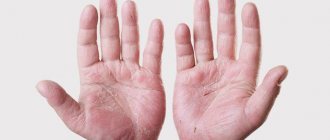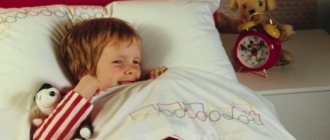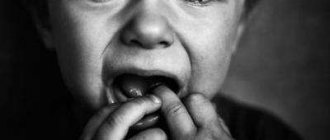Children under three years of age have poor control over their emotions, and any strong impression can provoke hysteria and even leave a lifelong imprint on the child’s psyche.
For an adult, fear is a normal phenomenon that the nervous system copes with quite quickly. But in a child under one year old, a strong emotion will have a painful effect on the functioning of his systems and behavior. Therefore, it is important to recognize the symptoms of fear in infants in time and understand how to help the baby get out of this emotional state so that there are no consequences.
Possible reasons
Fear in a baby can develop for several reasons:
- due to a sharp and sudden sound, shouting, noisy conversation;
- large animals;
- due to a thunderstorm or thunder, especially if the baby encounters these phenomena for the first time;
- stressful situations, swearing, scandals;
- Incorrect upbringing (strict upbringing, constant prohibitions) can also have a negative impact on the child’s psyche.
Only parents can keep the baby calm and protect him from fright. Due to the lack of their protection, children begin to develop various fears. With age, he will be able to overcome this negative feeling, but on the condition that explanatory conversations are held with him about why he should not be afraid of a dog, thunderstorm or thunder.
Is prevention possible?
We cannot protect a child from fears. Yes, there is no need for this. However, the correct behavior of wise adults can help a child avoid unnecessary (unnecessary) stress, as well as learn to adequately experience his own fears. To do this, you just need to follow three “golden” rules:
- Do not create preconditions for the formation of incomprehensible and uncontrollable fears in the child’s mind. Any threats of terrible consequences of bad behavior (the gypsies will steal, the woman will take it, the arm will fall off and other nightmares) should be prohibited.
- Do not try to protect the child from the normal process of learning about the world around him with all the dangers present. Of course, no one says that adults should not monitor the baby when he climbs a high ladder, but the baby should have the feeling that he is doing it himself. And if your baby falls and scratches his knee, give him the opportunity to get up and move on, don’t rush towards him as fast as you can, don’t instill the idea that every scratch poses a direct threat to his life.
- Prepare your baby for the unexpected. Before your first trip to kindergarten, the circus or zoo, on a visit, before traveling by train or plane, tell us in detail about what you are about to see, hear and experience.
Everyone experiences childhood fears. For most of us, they pass without a trace and are gradually replaced by adult and already fully realized stress and anxiety. But for some, the psychological trauma experienced in infancy leaves an imprint for the rest of their lives. To prevent this from happening to your baby, show wisdom, attention and adequate parental care. Remember: you cannot protect your child from falling, but you have the power to teach him to rise and boldly continue to move forward, learning and conquering this amazing and vibrant world.
Symptoms
Symptoms of fear may not always appear immediately, so often parents simply do not notice that something is wrong with their baby. Sometimes children even hide this condition from their parents. Therefore, parents must learn to recognize the signs of such a phenomenon.
There are certain symptoms that can help you understand that a child is scared:
- unreasonably increased excitability;
- sleep disturbance, the child often wakes up;
- nightmares;
- stuttering and speech impairment;
- the baby peed in a dream;
- crying or hysterics in a dream;
- fear of being alone, in the dark;
- talks in his sleep;
- sometimes after fright he loses consciousness;
- fear of some objects or creatures.
If your baby exhibits these symptoms, you should immediately seek professional help. It is not always possible for everyone to get rid of this problem on their own.
Enuresis is one of the symptoms of the disorder
How to give first aid
Of course, first aid to a baby in a moment of fright should be provided by an adult nearby. It is very desirable that this person be a mother or someone close and well known. It is quite obvious that the onset or non-occurrence of the negative consequences of fear on the health and psyche of the baby largely depends on how the adult behaves. It is very important with all your appearance to make the child understand two things: firstly, that he is loved and will not be offended; secondly, that nothing worthy of serious panic had happened.
Important! The reaction of adults should be aimed at making the baby calm down and feel protected. Parents' panic, loud screams, noisy expressions of sympathy and other fuss concentrate the child's attention on the incident and assure him of the idea that something terrible has happened.
Proper help for a child when he is scared should include two main components:
- Affection, love and tenderness.
- A gentle shift of attention to something positive.
If we are talking about a very small child, take him in your arms, gently caress him and calm him down with even and quiet words.
The baby will not understand their meaning, but will perfectly feel the general mood. You need to talk more substantively with an older child. Try, without losing your composure, to explain to the child what caused his fear (you may even need to confirm that there were reasons for fear), but be sure to tell him under what conditions there is no need to be afraid of danger. Find out the causes of colic in newborns.
For example, a thunderstorm is not scary if you are inside the house, but once you are outside, you should not try to hide from it under a tree; it is better to find dense, low-growing thickets. The child must clearly understand: there is salvation from any danger, this will develop a positive attitude in him, will not allow him to concentrate on fear, and at the same time will form knowledge that may someday save his life.
Risk group
According to experts, only some children are at risk.
- Children who have problems with the central nervous system. They do not cope well with their positive and negative emotions.
- A category of children whose parents and relatives constantly tell them about danger and various fears. Parents try to protect them from dangerous things and talk about how painful it will be if they stick their fingers into a socket. Some people don't want their children to come into contact with street animals and tell them how bad dogs bite or cats scratch. As a result of this, children begin to become panicky about encountering these objects, and when confronted, severe fear appears.
- Children who are greatly protected, protected from any negativity. As a result of this, the central nervous system practically does not receive any hardening, and at the slightest experience it malfunctions - the child becomes frightened.
Fright in newborns
The most difficult thing to identify is the symptoms of fright in infants. The reflex response to an unexpected action in an infant manifests itself as follows:
- heart rate increases;
- breathing becomes intermittent or rapid, as a result of which the child may experience coughing, coughing and even choking;
- pupils dilate;
- physical disturbances are observed (the newborn may pee frequently, be lethargic, sleepy or irritable);
- psychological disorders (cowards, twitches during sleep).
If you notice these signs, it means your baby is scared of something and needs professional help.
A child psychologist will help you choose the most effective and gentle method for treating this phenomenon.
Fear in the womb
Intrauterine fear has the same causes as fear in a baby or one-year-old child. Not every woman can determine such a reaction in the child that is inside her.
According to experts, if a child in the womb often shudders and behaves restlessly, regardless of the time of day, then he was frightened by something or someone.
This reaction is transmitted to the child as a result of the fear of his own mother.
Consequences
If infantile fear is not recognized in a timely manner, its consequences can be dire. Sometimes children themselves outgrow fear that appeared in infancy. At the age of one, he may be very afraid of dogs, and by the age of 9 he will want to have one for himself. But as medical practice shows, the consequences of fear in adulthood can develop into serious problems. Such a person may experience panic attacks and hysterical attacks. As a result, the following problems develop:
- nervous tics and stuttering;
- the child practically stops talking, which entails mental retardation;
- endless nightmares lead to the development of severe aggression;
- on the basis of this, a number of phobias develop in relation to people, animals, certain objects and situations;
- the child begins to speak often at night.
Such consequences entail serious disturbances in the psyche and the functioning of internal systems, especially the cardiac, vascular and genitourinary.
Fear can result in regular nightmares
Traditional therapy
Today there are many methods, both traditional and non-traditional, that help cure severe fear in children at any age. Let's look at each method in detail.
Treatment of fear in children involves a number of activities aimed at strengthening and healing the body:
- sports, hardening, dousing, dancing;
- balanced diet, use of sedatives that have a beneficial effect on the psyche;
- maintaining a sleep schedule;
- taking a warm bath or shower in the morning and evening.
These very simple measures will help your baby get rid of fear in a fairly short period of time.
ethnoscience
Wrapping a baby in a damp sheet or diaper helps very well when a baby is frightened. To do this, you need to undress the baby and wrap it in a damp cloth for half an hour.
Drug treatment of fear in children is prescribed by specialists - neurologists or psychotherapists. Before starting such treatment, the doctor must check whether the child really has a fear.
But, as practice shows, taking medications to treat such a reaction in children is rarely practiced.
Traditional medicine will help. It uses several effective ways to treat this disease.
- To relieve a child’s state of shock, he needs to be given a warm drink - tea, a glass of water (necessarily with sugar). Infusions of medicinal herbs have proven themselves very well.
- Traditional healers use prayers and spells in the treatment of childhood fear.
- Egg rolling is one of the most ancient and reliable ways to get rid of this problem in childhood.
- Healing with holy water.
Herbal infusions
Properly prepared herbal decoctions and herbal baths have a calming effect on the nervous system and the entire body as a whole.
To treat children's fear from dogs, thunder, loud and scary sounds, you can use the following herbs:
- chamomile;
- hop and angelica root;
- St. John's wort inflorescences;
- stinging nettle leaves;
- heather;
- Melissa
You need to take a pinch of each herb and brew it with a glass of boiling water. Infuse the decoction for two hours, take 50 g 2 times a day. The result of treatment will appear within a month after completing a course of traditional therapy.
There is another option on how to cure childhood fear between the ages of 2 and 11 years. To prepare the decoction you will need several herbs:
- valerian;
- heather;
- motherwort;
- cottonweed.
Mix 2 parts of each component and add two liters of boiling water. Leave covered for two hours. Take 4 times a day throughout the day. The course of treatment is 9 days.
Heather will help calm fears
Prayers
The causes of fear in infants and children of any age can be eliminated with the help of effective prayers. The evil eye can also be cured in this way.
This rite is only suitable for baptized children. The child is seated or placed in a crib in the middle of the room. The person reading the prayer should stand behind him. A church candle is lit, then prayer words are read:
“Fear leave the heart, head, bones and blood of the servant of God (name). Almighty, free the patient’s thoughts from all negativity, cleanse his soul and body from fear and fear. Amen".
This prayer is read for older children.
For infants and children under 3 years of age, a different prayer is read. It helps cure fear of the dark, various phobias and fear.
You need to read strong prayer words three times a day - before breakfast, lunch and dinner:
“Leave Satan the body and head of God’s servant (name). I drive out infantile fear from bones, blood, muscles and all human flesh. It’s not me who drives me out, but the Lord God who frees me and heals me. Amen".
Conspiracy from fear
Water spell
Sometimes, when a child is very frightened, who constantly talks in his sleep, pees, cries and is hysterical, prayers are powerless. Then a strong conspiracy, which is read on the water, can help. It helps to cure a child at an early age, when the problem has not yet started.
To carry out such a ritual, one of the parents needs to go to church, purchase fresh holy water and thirteen candles. After the waning moon phase begins, you need to light all the candles, place a container of holy water next to them and, looking at them, say the following spell:
“I look at the holy water and ask God for healing for my child. Our Lord Almighty, drive away all fears, frights and all evil spirits from my child. May my child be healed with holy water, may his thoughts become bright and pure. Amen".
After reading the plot three times, wait until the candles burn out. Wrap them in paper or scrap cloth and throw them away at an intersection. Wash the child three times with holy charmed water. The procedure must be carried out three days in a row, in the morning, at lunch and in the evening.
Conspiracy text
Wax casting
There is another option to cure fear in a child - wax casting. To perform this ritual, you will need wax - 150 g (you can use wax candles without a wick), as well as water - 2-3 liters.
The frightened baby is seated in a chair. Over a lit burner, melt the wax in a ladle or metal mug, and, holding it over the baby’s head, pour it into a container of water. During the pouring process, you need to read the spell words:
“The Holy Mother of God, the angels, archangels and all the apostles stood on Pine Mountain, driving out fear and fear from my child. They healed the soul, body, blood, head and bones of the servant of God from all evil spirits and dark thoughts. I pray to You, Most Holy Theotokos, that my child will become healthy and that his fear will leave him forever. Amen".
After reading the plot, the poured wax must be taken to a vacant lot far from the house and buried in a deserted place. Water is poured onto the street or into the toilet.
Egg rolling
This is another very powerful ritual, after which the baby’s fears and fears disappear. To perform this you will need a homemade chicken egg, 3 candles and church water.
The patient is seated in a chair. A container of holy water is placed at the head of the bed, and candles are lit nearby. An egg is taken and rolled over the entire body, starting from the head to the very feet. While rolling out, the “Our Father” prayer is read three times. After rolling out, the egg is driven into a bowl of water. The contents of the jar should be poured onto the street or into the toilet. After this you need to cross yourself three times.
The egg rolling procedure is carried out for three days in a row. After this, you will notice how your baby has become calmer and stopped being afraid.
Treatment methods
Treatment of fear should be comprehensive: you must relieve the symptoms and gently eliminate the root cause of the fear of the baby.
- First of all, you need to surround your baby with care. He should feel safe, and constant maternal presence will help give him this feeling.
- Baths with herbal decoctions and pine infusions can help the baby’s nervous system cope with stress.
- If your baby is afraid of strangers, there is no need to avoid contact with them. It is necessary to gradually accustom the baby to their presence. Greet the visitor joyfully and explain to the child that he is a good person. If the baby cries, do not insist on communication, but try to continue contact next time. Guests can bring inexpensive toys or treats and give them to the baby.
- Fear of animals also needs to be fought, because cats and dogs are an integral part of our lives. The baby will encounter them at a party and on the street. With your little one, look at pictures in books with images of pets, explain that they are kind if you treat them well and with respect. Watch funny videos with cats and dogs with your baby. As soon as the baby gets used to “virtual” communication with animals, you can gradually establish “face-to-face” communication.
- If the fright was caused by everyday circumstances, for example, the baby was burned by boiling water or an iron, choked while swimming in the bath and slipped under the water, then you need to gently correct this situation.
You can buy armbands for swimming, show how they float in the water and explain that they will prevent the baby from drowning. If your child gets burned, explain that they need to be careful when handling household items. A child should not walk around hot mugs, irons and plates “seven miles away”, because he needs to grow up and learn to use them.
If home methods do not eliminate the symptoms and consequences of fear, you should consult a neurologist. A specialist may prescribe medication therapy for you. Homeopathy, hypnosis and play therapy are indicated for adult children. Do not be afraid that the medications prescribed to your child will harm him - ignoring the symptoms of fear can lead to serious psychological problems that will affect the child’s behavior. In addition, if emotional problems are not treated, it often leads to enuresis and speech pathologies.











